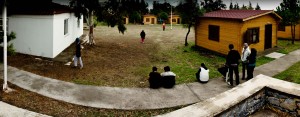This small PIKPA booklet is a collection of stories taken from interviews held in December 2012 with people who shared some days of their lives in PIKPA – be they refugees or activists or both. It gives a small hint on what solidarity can be like through the only example of a self-organized “welcome” centre in Greece.
Interview with a Syrian refugee in PIKPA
Elias (name changed) is 20 years old. He is from Aleppo where he was also studying to become a mechanical engineer. His plan is to go to the UK. The way from Syria to the UK is hard, risky and expensive. He shared the dangers of the road with his sister and his cousins.
“My father told us: You must leave. Here you will be killed. He could not come with us. My parents and the rest of the family had to stay in Syria.”
Elias was forced to join the army, but he didn’t accept to kill his people.
For more than a month he was on the road to Lesvos.
“We were terrified. We didn’t know which way we will be send to Europe. The smuggler said we should not worry. The boat was big, we should be only 10 passengers and the journey over the sea would take only 30 minutes. When we arrived at the coast we saw the rubber boat. We were 42 persons traveling in the night. The waves were enormous. Then the engine had some problems. I thought we would die. I told my sister to close her eyes and we started to pray. If I knew how dangerous it was I would have never taken my sister with me. We arrived wet and scared to death on Lesvos. We went ourselves to the police but they sent us away telling us to come back the next day. When we were finally arrested we stayed three days in prison. 70 men in a cell for two. We were locked up together with penal detainees.”
Upon release the family stayed five days in PIKPA and then left.
“I would have never left Syria if there wasn’t war! Now my plan is to study and then return to my country and help to build it up.”
6th of February: Farewell in the port of Lesvos
On Wednesday 6th of February the strike of the sea workers was forcibly stopped by the Greek authorities and the ferry traffic started again. That was when the recently in PIKPA hosted refugees could finally leave towards Athens.
The refugees upon being asked in a plenary session among solidarity people and refugees in PIKPA what was their most important wish had informed us that they wanted to leave as fast as possible from the island. Together we cleaned PIKPA and prepared it for the next newcomers. In the afternoon a municipality bus took them to the port and we were all there to say goodbye until they disappeared into the ship. We felt happy, that this part of their journey seemed successful for them. We promised each other to stay in contact and exchange our news also in future. Everybody in the port – including the coast guard – had to realize that these people are not alone and that we walk this road together in solidarity.
LESVOS: Again 50 refugees in PIKPA self-organised reception camp
As refugees continue to arrive on Lesvos island the network “village of all together” has transferred again almost 50 persons to PIKPA self-organised and open reception camp.
On Saturday 2nd of February 2013, 26 refugees – mostly Afghans and Syrians – were transferred to PiKPA. They were detained more than a week in the police station of Mytilene under very bad conditions.
“We couldn’t even lie down,”
some of them said. Upon release they received a deportation order (so called “White Paper” valid for 30 days) by the police and found themselves homeless on the streets since the strike of the seafarers had paralyzed the general ferry traffic between mainland and islands. The freed refugees were desperate not knowing where to go. As we had promised earlier this year as network “the village of all together” no refugee should stay anymore homeless and helpless in the streets. So we decided to take them to PIKPA.

On February 4th another 14 people were released from detention. We went to the police station and demanded them to be transferred directly to PIKPA. Today more refugees might be released and brought to PIKPA. We are preparing food for 50 persons today.
All of these people have suffered from the hazardous travel of the sea endangering their lives repeatedly to reach a safe haven in Europe. The strict controls on both sides of the Aegean, by Turkish Gendarmes and Greek Coast Guard / Frontex on the other side, make the border crossing a matter of life and death. At the same time weather conditions are creating additional dangers for the small, overcrowded and often insufficiently equipped dinghy boats. One of the refugees said:
“Three times we were caught by the Gendarmes. The fourth time we almost died in the huge waves.”
PIKPA is continuing and we need all your support!
Snapshots of a human tragedy that continues, by Efi Latsoudi
The bodies of 21 migrants were found on a beach on the Aegean island of Lesbos, December 15, 2012, after the sinking of their boat. A young Afghan of 16 years, one of only two survivors indicated that the boat had left the coast of Turkey, had thirty
people aboard, mostly Afghans, when it capsized because of bad weather. Efi Latsoudi, resident and volunteer Mytilene the charity « To Chorio tou Oloi Mazi », which helped the families of the victims in their efforts, discusses the moments of this drama, and the obstacles, and indifferenceof the authorities.
Continue reading Snapshots of a human tragedy that continues, by Efi Latsoudi
